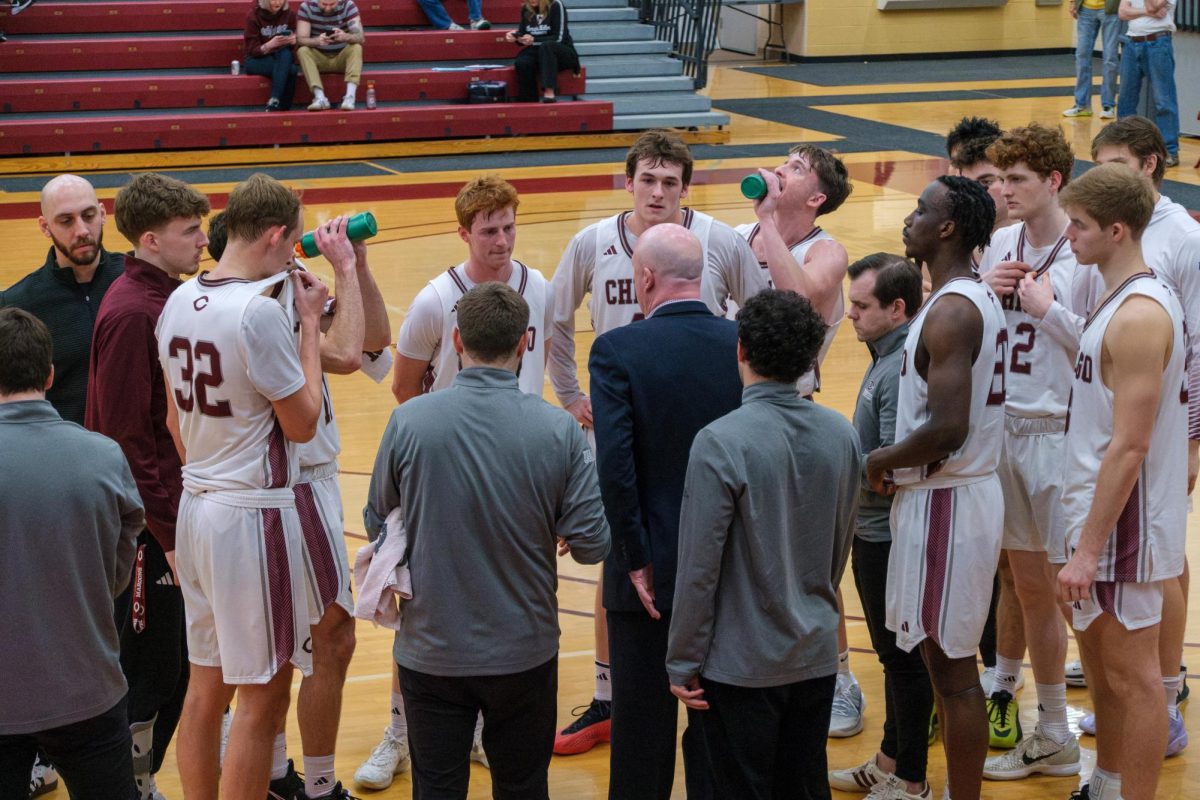No one was surprised to see fourth-year Ryan McCarl toe the line at cross-country Nationals this fall. The Muskegon, MI, native established his running prowess long ago with impressive performances at conference and regional meets. Bolstering his NCAA credentials further, he competed at the 2005 national championships where Chicago’s men landed ninth in the nation, the highest team-finish in program history.
The only Maroon to race against the best of the best in 2007, McCarl was aiming for All-American honors and appeared to be within reach of the top 36 for the first half of the race. In the end, that Saturday simply was not McCarl’s day, and the wunderkind-turned-team stalwart fell back to finish 141st in a field of 240 while clocking in with a respectable 26:03 8K.
“While I’m glad I got to have the experience of competing at Nationals as an individual, there’s no doubt that it would have been more fun with teammates along,” McCarl said. “The experience of racing alone really drove home the lesson that it’s a team sport, and a lot of the motivation to race well comes from a desire to help out your teammates.”
McCarl’s commitment to the concept of distance running as a group endeavor is somewhat impressive, given his immense talent, his career-long status as a key component of the men’s cross-country program, and the tendency of the uninitiated (and, perhaps, the deluded) to view cross-country as a lonely sport.
With an extraordinary prep background, McCarl came to the University already poised to do great things.
“Ryan was the best recruit in program history,” head coach Chris Hall said. “He had the fastest two-mile time we’ve ever recruited. He placed ninth at the cross-country state championships during his senior year, and many of his personal records were truly phenomenal.”
Yet, McCarl, who will receive a joint B.A.-M.A. degree in International Relations next month, was reticent about a collegiate career. Like most student-athletes in the College, Chicago’s academic reputation drew McCarl to Hyde Park. Only after enthusiastic persuasion from Hall did the then-hesitant prospie join what during his rookie season would become the best squad in program history. In the end, he found that training with a group, which included 2006 Rhodes Scholar Nick Juravich (A.B. ’06), offered both intellectual and physical stimulation.
“Ryan was definitely very focused on his studies and concerned that athletic demands would make him cut corners academically,” Hall said. “But I don’t think that ever happened during his time here.”
“I learned at least as much from having political and philosophical discussions with my teammates during long runs and at Pierce dinners as I ever did in class,” McCarl said.
While balancing class and athletic commitments proved to be less of an issue than expected, McCarl’s true kryptonite during his collegiate tenure was a long-standing propensity for injury. Benched during his senior year of high school by a persistent stress-fracture in his lower left leg, McCarl has been forced to sit out several track and field campaigns with similar injuries. While he was able to compete during every cross-country season, a bout of heat stroke during his first-year conference race pushed him to the sidelines at 2004 NCAAs, where Chicago’s men placed 16th.
“Training Ryan has been like walking on egg shells almost every day,” Hall said. “I think it’s because he’s so talented, he can come in, not in the greatest shape, and do some really impressive things. Plus, he’s so competitive. This combines and leads him to run above his fitness level, and he gets hurt.”
Hall also makes the conjecture that McCarl’s frequent, prescribed absences hampered his ability to comfortably lead the men’s contingent during his final cross-country season, but the Maroons’ resident comeback kid hit his stride during the winter term, which ended in conference gold for Chicago’s men and women.
“Heading the team during his senior year seemed to be a little awkward, at first,” Hall said. “But he really got going and guided our youngest runners during the indoor season.”
Chicago, which takes pride in assembling a diverse and passionate student body, seems to have done well by the diversely passionate McCarl, who will work for a civil liberties lawyer in Cambridge, MA, following commencement. Despite the bumps and bruises along the way, McCarl, who points to his program-record-breaking 8K at the 2007 Regional meet and his expedited M.A. as his greatest accomplishments to date, relished his years in Hyde Park, where he seems to have embodied the ideal of the scholar-athlete.
“I was proud of the way the team competed during each of my years at the U of C. Each season was fun in its own way, and I learned a lot from my teammates and coach each year,” McCarl said.`








